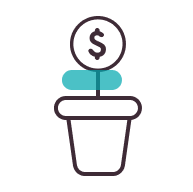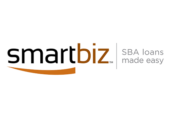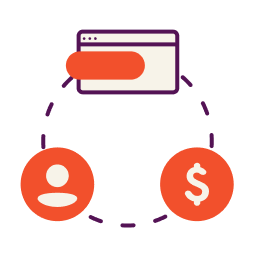Advertiser & Editorial Disclosure
One of the most notable partners in the business financing space is the Small Business Administration (SBA). Their small business loans have been instrumental in providing loans to businesses in a variety of industries, in amounts ranging from a few thousand dollars to millions. Some SBA loans go to startup businesses, but it can be challenging for new businesses to find the right loan and lender.
How can you find and qualify for SBA startup loans? Here we’ll provide an overview of loan programs that may be available to your startup business and warn you about some that may be harder to secure.
How do I get an SBA startup loan?
The SBA itself doesn’t generally make small business loans. (An exception is Disaster Loans including Economic Injury Disaster Loans or “EIDLs” which the SBA funds directly.) Instead it guarantees loans made by approved lenders, including preferred lenders who have more latitude in approving loans without SBA review.
SBA program guidelines generally require that small business applicants meet these basic requirements:
- U.S.-based business, doing business in the U.S.
- Meets SBA size standards
- Is a for-profit entity (non-profit daycares are an exception and there are other exceptions for EIDL and PPP loans)
- Acceptable credit
- Owner supported and funded
- Cannot get similar funding elsewhere
- Operates a legal business in an SBA-approved industry
- Is owned by someone who doesn’t have a criminal record that would exclude them from qualifying.
If the lender ensures the application meets the SBA requirements, it will be able to collect the guarantee from the SBA if the borrower defaults. This means lenders may be more willing to extend these loans to startups and small businesses who may not qualify with other lenders.
On the other hand, the guarantee doesn’t typically cover 100% of the loan amount so lenders do take some risk with their own funds. Plus lenders with a high rate of defaults will lose their ability to make SBA loans. SBA lenders may choose whether to approve specific applications, as long as they don’t discriminate on a prohibited basis. This means that one SBA lender may be more willing to work with a startup business than another.
While the SBA does not impose a specific time in business requirement for most SBA loans, individual lenders may. It is typical for lenders to only make these loans to businesses with a two-year track record of solid revenue. However, they may waive that requirement for businesses with a good credit and a solid business plan along with experience successfully running a business in a similar industry. (Also see the down payment requirements for startups later in this article.)
This means not all SBA lenders or loan programs are a great fit as small business startup loans, but you shouldn’t automatically rule them out either. With the right qualifications and some persistence you may find one that works for you.
Popular SBA startup loans
The SBA has over a dozen separate SBA loan programs for small businesses. Among these loan programs, however, three tend to be the most popular. They are:
- SBA 7(a) loans (including SBA Express),
- SBA 504/CDC loans, and
- SBA microloans
Here we’ll provide a high level overview of each program and what to expect as a startup. You can learn more in this in-depth guide to SBA loans.
SBA 7(a) Loans
SBA 7(a) loans can be a fit for small businesses that need financing for working capital, to buy equipment, or to purchase commercial real estate. The maximum loan amount is $5 million. These SBA loans have lower rates than most online lenders or even small business credit cards, and you’ll generally have between 10 to 25 years to pay the loan back, depending on the purpose of the loan.
In 2019, the SBA reported that 17% of 7(a) loans went to businesses that planned to use the funds to open their business (brand-new startups), while another 19% went to business that were younger than two years old.
SBA Express Loans
These loans are similar to standard 7(a) loans but they offer loans up to a maximum of $350,000 (temporarily increased to $1 million through December 31, 2020 due to the coronavirus crisis). Getting an approval can be much quicker though significant documentation may still be required. No collateral is required for loans up to $25,000. The maximum repayment period is seven years.
SBA 504 Loans (CDC loans)
If your business needs to buy or renovate a building, or will need to invest in major equipment, the SBA 504 loan (also called a CDC loan) is worth investigating. It’s available for qualified borrowers who want to buy real estate, invest in construction, or update equipment and machinery. These loans are often used for multi-million projects.
With this loan program, a private lender typically loans 50% of the project cost, a non-profit lender (Community Development Corporation) lends 40% and the borrower contributes 10%. This requirement means a startup business must have capital from self funding, investors or other sources to make one of these loans work. This isn’t a loan for those with no money or experience in business.
Another hurdle is the fact that the applicant’s cash flow must be used as the primary source of repayment. The Standard Operating Procedures for 504 loans state: “..if the lender’s financial analysis demonstrates that the small business applicant lacks reasonable assurance of repayment in a timely manner from the cash flow of the business, the loan request must be declined, regardless of the collateral available or outside sources of cash.” However, if your business has been making money or can clearly demonstrate how it will do so, this type of loan may be a possibility.
The SBA reported that in 2019 13% of 504 loans went to startup businesses, while 8% went to firms in business for two years or less.
Microloans
Have you heard about the SBA microloan? This smaller, more flexible financing option is designed for small business owners in any stage of the game— even those who haven’t launched yet. For this reason, of all the options presented here, this one is the most likely source of funding for those looking for an SBA startup small business loan. Lenders may also be more flexible with personal credit score requirements for microloans, though you should have a good explanation for any negative items that appear on your credit reports.
These loans are made by approved intermediaries, which are typically non-profit or quasi-public organizations. The SBA lends money and makes grants to these organizations, which in turn make loans to small business borrowers.
Loan amounts go up to $50,000 but the average loan amount is typically less than $15,000. These are often popular as working capital loans. In addition to working capital, loan proceeds may be used for inventory or supplies, furniture or fixtures, and machinery or equipment.
These are short-term loans with a maximum repayment period of six years and borrowers may be required to participate in training or mentoring sessions. These loans are often designed to help underserved borrowers who may have trouble getting financing elsewhere.
EIDL and PPP
The Economic Injury Disaster Loan program (EIDL) which is part of the SBA Disaster Loan program, and the Paycheck Protection Program (PPP) created by the CARES Act have both helped many small businesses during the coronavirus crisis. However, startup businesses will find they are unlikely to qualify since the loan amount is based on past revenues and, in the case of PPP, payroll. In addition, EIDL funds may not be used to start a new business. PPP loan proceeds may be used for payroll, and other specific expenses such as rent, mortgage interest and utilities that were in place by February 15, 2020. In short, PPP and EIDL are not meant to be startup business loans.
Who qualifies for SBA loans?
In addition to meeting the basic business requirements listed above (such as being a for-profit entity in the U.S.), the bank will have its own financial requirements. The obvious one is credit. While SBA loans exist as an opportunity for those who may not qualify for funding elsewhere, your business is still required to demonstrate an ability to repay the loan.
A good personal credit score is an indication you can manage your loan payments and are a good credit risk. If you have poor credit, your first course of action is to improve that number so that you can appear to be a good risk in the eyes of the lender. If you don’t know your personal credit score, stop everything, and get it. You can only know what improvements you need to make after you know your score. There are 138+ places to get your credit scores for free.
These small business loans may also require a business a business credit check. For 7(a) and Community Advantage loans for less than $350,000, the lender is required to get a FICO SBSS Score. This score takes into account the personal credit of owners (for all with 20% or greater ownership), the business credit score of the business and financial or application data. Currently the passing score required for the SBA is 140 (on a scale of 0-300, where 300 is the “best” score). Many lenders want to see a score of 160-165 or above. Currently Nav is the only place business owners can review a FICO SBSS score for their business.
Not every small business will have strong business credit scores, so if you find yourself without them, don’t panic. It can be easier than you think to start building business credit. One way is to do business with vendors and suppliers who will report your on-time payments to the credit bureaus. Another way is to get a small business credit card that reports to business credit bureaus.
Depending on the loan you apply for, you may also need a demonstrated history of generating revenue. While a true startup may not have any history to share with a lender, a business plan or carefully laid-out explanation of how the funds will be used to start the business is a minimum SBA loan requirement. Generally lenders who make SBA loans want to see the following:
- In business at least two years
- A solid business plan
- Demonstrated plan for use of loan proceeds and how they will be repaid
- A financial forecast that is demonstrated by cash flow reports, profit and loss sheets, and budgets for the next few months and the years you are paying the loan
- Available collateral
Is it possible that a lender will extend credit to a business that doesn’t meet all of the above? It can and does happen. Most young startups have very little of the documentation that shows sales and future revenue, but in some cases they can overcome these obstacles by showing a solid and researched plan for using the loan proceeds to make money, as well as having good credit, a substantial down payment, and collateral to secure the loan. Business experience on the part of owners helps as well.
Top SBA Lenders
So, you think you can qualify for an SBA startup loan? You’re ready to start scouting out lenders! Every lender can set its own requirements on top of SBA requirements (again, as long as it doesn’t discriminate). Here’s a quick list of some of the more active players in the SBA loan market.
Smartbiz SBA loans
If you want the security and reputation of an SBA loan, but value a shorter loan application process through online lenders, SBA loans from Smartbiz may be the right choice for you. Their application is online and automated, even allowing your personal and business tax returns to be imported electronically. (That’s less paperwork for you!) Smartbiz doesn’t make SBA loans; instead it streamlines the process to match you to SBA lenders looking to work with businesses like yours.
SBA Loan by SmartBiz
Chase SBA loans
If you like the customer service you’ve received as an existing Chase customer, or you are new to the brand but have heard good things, you’ll be happy to know that Chase offers SBA loan program offerings for both SBA 7(a) and 504 loans.
Chase also offers the popular SBA Express loans, which is designed for smaller real estate purchases, buying a new business, or working capital. Both fixed and variable rate terms are available. Chase loans traditionally must be made in person, but due to the COVID-19 crisis that may not be an option. Check online to find the latest information.
Wells Fargo SBA loans
Wells Fargo advertises their partnership with the SBA and currently offers 7(a) and 504 loans to new and existing customers. The Wells Fargo team is a long-time partner to the SBA programs and is a preferred lender.
The bank requires that you be an existing and on-going for-profit business with a tangible net worth of no more than $15 million, and have an average net income of more than $5 million during the last 24 months..
The Huntington National Bank SBA loans
Reported by the SBA to be the “#1 SBA 7(a) lender in the region made up of Illinois, Indiana, Kentucky, Ohio, Michigan, West Virginia, Western Pennsylvania and Wisconsin,” Huntington specializes in SBA 7(a) loans, Express loans, and the 504 lending program.
Frequently Asked Questions
Are you still unsure about an SBA startup loan? Here are a few additional questions you may find helpful.
How much down payment is required for an SBA loan?
The SBA generally uses the term “equity injection” or “equity contribution” rather than down payment. Many times it is up to the lender to determine equity injection requirements. However, when it comes to startup businesses, SBA 7(a) Standard Operating Procedures state:
“At a minimum, SBA considers an equity injection (Applicant contribution) of at least ten (10) percent of the total project costs (all costs required to become operational, regardless of the source of funds) to be necessary for a start-up business to operate on a sound financial basis. SBA considers a business to be a “start-up” for the purpose of determining equity injection requirements if it has been in operation (i.e., generating revenue from intended operations) for up to 1 year.”
Acceptable equity injection sources include:
- Cash that is not borrowed.
- Cash that is borrowed through a personal loan to the business owner with repayment demonstrated to come from a source other than the cash flow of the business (the salary paid to the owner by the business does not qualify).
- Assets other than cash (appraisal or valuation may be required)
- Standby debt, which means debt where no payments of principal or interest for the term of the SBA-guaranteed loan.
In addition to that equivalent of a down payment, the SBA will often take a security interest in available collateral, though the SBA guidelines for most programs state loans cannot be rejected solely for lack of collateral. You should be prepared with a list of available collateral and the value of each.
Finally, borrowers typically must sign a personal guarantee that means the SBA may try to collect from personal assets (including home equity) if the loan is not repaid.
How can I get a loan to start a business with bad credit?
Traditional lenders such as banks or credit unions don’t usually make business loans to those with poor business and/or personal credit scores. Microloan programs may be more flexible, though. Online lenders may offer more flexibility, though you’ll have a hard time qualifying with little time in business and no revenue.
Note that alternative lenders may be flexible with credit requirements but they usually require documentation of revenues so it can be difficult for a new business to qualify. If you can wait, it’s best to keep working on your credit score and apply for a more affordable lending option with your new and improved business or personal credit score. In the meantime you can build your business knowledge and expertise with the help of your local Small Business Development Center or SCORE office. These organizations provide free business mentoring and they may even be able to help you find a way to get started by bootstrapping your business.
What is the interest rate?
SBA loan rates are calculated differently for each program. Some programs offer a variable rate and fixed rate option. For all programs, the SBA caps the maximum interest rate the SBA lender may charge, and rates are considered competitive with those of other traditional small business loans.
This article was originally written on July 30, 2019 and updated on August 17, 2020.





Have at it! We'd love to hear from you and encourage a lively discussion among our users. Please help us keep our site clean and protect yourself. Refrain from posting overtly promotional content, and avoid disclosing personal information such as bank account or phone numbers.
Reviews Disclosure: The responses below are not provided or commissioned by the credit card, financing and service companies that appear on this site. Responses have not been reviewed, approved or otherwise endorsed by the credit card, financing and service companies and it is not their responsibility to ensure all posts and/or questions are answered.